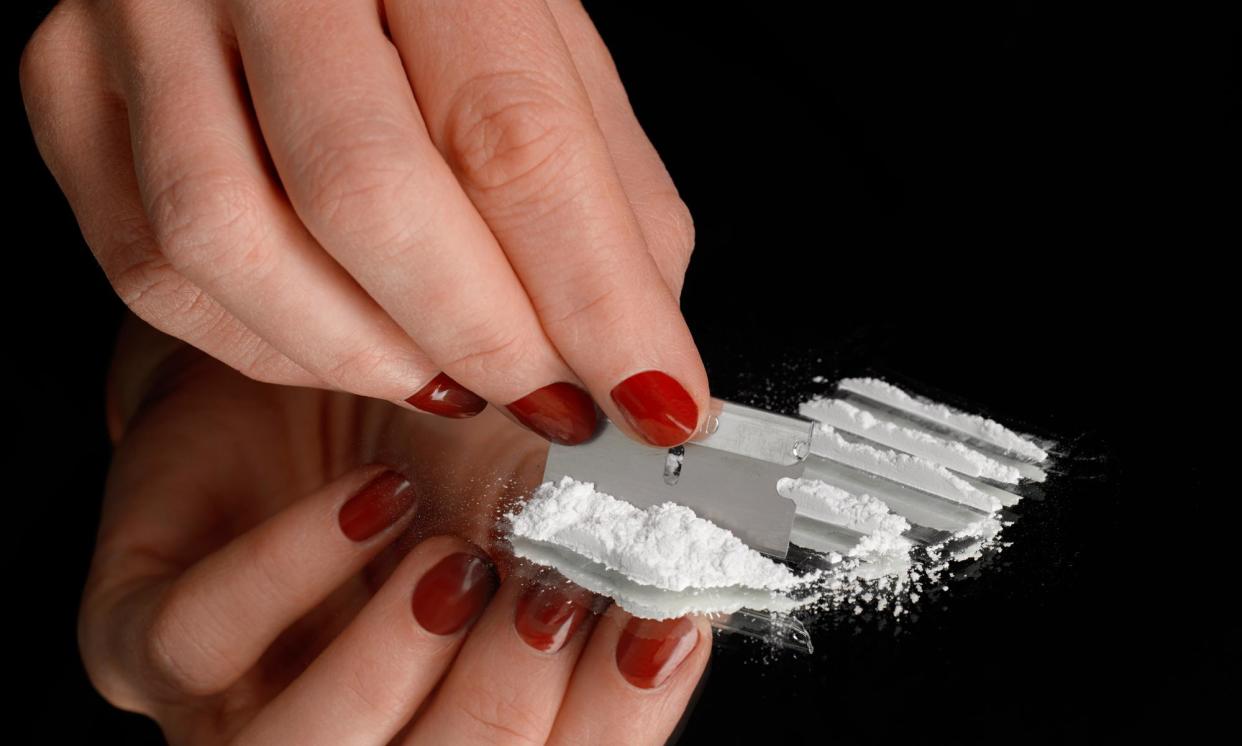Opioid-laced cocaine 100 times more potent than heroin sparks Victorian health warning

A synthetic drug 100 times more potent than heroin has been found in cocaine currently being sold in Melbourne, prompting a warning from Victoria’s health department.
The Department of Health on Tuesday issued a drug alert for cocaine laced with protonitazene, a novel synthetic opioid (NSO).
The department’s alert said there had been a string of recent incidents where people had bought the powder thinking it was cocaine, which have resulted in “serious harm”.
Related: Victoria’s pill testing service to become permanent after 18-month trial
“The product appears to produce strong adverse effects such as loss of consciousness, respiratory depression, and life-threatening hypoxia (insufficient oxygen for normal functioning),” the alert read.
The alert came after a notification from the Penington Institute on Monday of “recent overdoses due to protonitazene toxicity in the Melbourne area drug supply”.
“Protonitazene is a potent synthetic opioid that can be up to 100 times stronger than heroin,” the chief executive of the Penington Institute, John Ryan, said in a statement.
“It has recently appeared on several occasions in Victoria and interstate, including in what was understood to be cocaine.”
A white powder sold as cocaine contains protonitazene, a fatal substance that can cause loss of consciousness and breathing difficulties.
If you experience or witness adverse drug effects, call Triple Zero (000) immediately.
More: https://t.co/22ooeJ56GV pic.twitter.com/p2VjK4Z6Tl— Victorian Department of Health (@VicGovDH) July 1, 2024
The health department said cocaine and protonitazene were “very different substances”, with the latter an “an extremely potent NSO” that can “produce strong effects in very small amounts”.
“Cocaine produces stimulant effects, whereas protonitazene produces sedative effects and may lead to opioid overdose,” the alert said.
“Using protonitazene with depressants such as alcohol, GHB or depressant drugs (such as Xanax or Valium) increases the risk of overdose.”
It said respiratory depression also “appears more quickly” with NSOs.
Ryan said the combination of a stimulant and a powerful opioid was “particularly dangerous”. He urged users to be aware of the signs of opioid overdose, such as slow breathing, difficulty waking and in some cases, tiny pupils.
Both Ryan and the health department suggested users carry naloxone, a medication that can reverse an opioid overdose.
The department said users should also be aware that “other false or contaminated drug products” may be circulating in Victoria, even if there were no specific warnings in place.
It comes after the Victorian government last week announced it would introduce drug checking, after 46 overdose deaths due to NSOs since 2022.
From later this year, a mobile drug checking service will be set up to attend up to 10 music festivals, and by mid-2025 a fixed site will also open in an inner Melbourne area close to nightlife and transport.
Related: Experts warn of influx of synthetic opioids amid calls for second Melbourne injecting room
Both the mobile and fixed-site services will be able to test the makeup of most pills, capsules, powders, crystals and liquids to identify deadly substances, including synthetic drugs.
The acting premier, Ben Carroll, said the latest warnings proved the need for the service.
“This is one of the reasons that has led us to doing what we need to do in terms of harm minimisation,” he told reporters in Footscray.
“We are doing a trial of pill testing and one of the reasons is that … drugs are laced with chemicals that young people don’t know they’re laced with. So that is concerning.”
In January, the chief executive of Canberra’s pill-testing venue said the detection of NSOs in pills sold as MDMA showed the need for similar services in other states.
In Australia, the National Alcohol and Other Drug Hotline is at 1800 250 015; families and friends can seek help at Family Drug Support Australia at 1300 368 186. In the UK, Action on Addiction is available on 0300 330 0659. In the US, call or text SAMHSA’s National Helpline at 988

 Yahoo News
Yahoo News 
